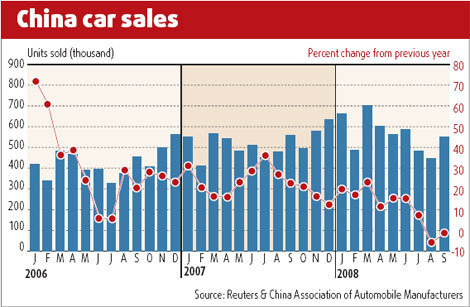Weakening market
Mei Xinyu, a researcher at the Chinese Academy of International Trade and Economic Cooperation under the Ministry of Commerce, says that this round of credit turmoil, the most serious economic crisis in the US since 1929, will have a serious impact on the real estate and automobile industries.

Last month, US auto sales dipped 27 percent, the worst performance in 17 years.
On October 10, General Motors' share price tumbled to $4, the lowest in 60 years. On the same day, rival Ford's shares ended at $1.99, the lowest in 26 years.
JD Power warned on October 9 that GM and Ford are in the danger of collapsing in 2009.
However, China, the world's No 2 auto marketplace, is still offering US automakers growth opportunities.
In the first nine months of 2008, GM sold 830,480 vehicles in the nation, up 10.2 percent from the same period in 2007, remaining on track for double-digit sales growth this year.
Analysts say they do not believe that the US credit crisis will have as much of an impact on Chinese automakers as it is on their US counterparts.
"The crisis won't impact directly on China's auto industry. Currently, the credit crisis is having more of an effect on China's auto parts industry, as a result of their big exports to the US," says Xu Changming, an auto analyst with the State Information Center.
But "if the crisis continues to strike the economy in emerging auto markets that are China-made vehicles' main overseas destinations, such as Russia, Middle East and Africa, vehicle exports will face a big hit," adds Li Chunbo, an analyst with CITIC Securities.
"The credit crisis will undoubtedly impact on consumption and investment in China's auto industry in the long-term," says Dong Jianhua, an analyst with Southwest Securities.
"The financial crisis will seriously hurt consumer confidence, driving down demand in the auto market. Then it will influence production and investment," says Dong.
(China Daily October 20, 2008)